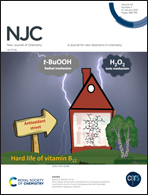8-Hydroxyquinoline platinum(ii) loaded nanostructured lipid carriers: synthesis, physicochemical characterization and evaluation of antitumor activity†
Abstract
Every year the incidence of cancer and the death rate are increasing worldwide. The drug 8-hydroxyquinoline platinum(II) [PtCl(8-O-quinoline)(dmso)] (8HQ-Pt) has been identified as a promising antitumor complex. Nanostructured lipid carriers (NLC) are second-generation drug nanocarrier systems that have superior advantages over other kinds of colloidal carrier systems. 8HQ-Pt compound loaded NLC formulations of cetyl esters (SS) were synthesized via ultrasonication in the presence of two different liquid oils: capric triglyceride, or olive oil. The physicochemical and microscopic characterizations of NLC were analyzed via dynamic light scattering (DLS), transmission electron microscopy (TEM), Fourier transform infrared spectroscopy (FTIR), thermogravimetric analysis (TGA), differential scanning calorimetry (DSC) and X-ray diffraction analysis (XRD). In vitro drug release and cytotoxicity, cell uptake and apoptosis assays against the human colon cancer cell line HT-29 were investigated. The results showed that NLCs indicated a narrow size distribution and a mean particle diameter in the range of 136–159 nm. The thermal characteristic analysis confirmed the stability of NLCs up to 185 °C. Encapsulation efficiencies of the 8HQ-Pt compound in NLCs were about 80% and the 8HQ-Pt compound in the formulations showed a controlled release profile during 72 h. The release profiles of these two different formulations and the antitumor effect on the HT-29 cell line were compared with those of the free 8HQ-Pt compound. The cellular uptake of two different NLC groups was proved by fluorescence microscopy and the presence of capric triglyceride liquid oil in the formulation increased the intracellular drug delivery capacity when compared with olive oil.



 Please wait while we load your content...
Please wait while we load your content...